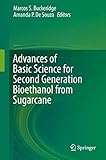Advances of Basic Science for Second Generation Bioethanol from Sugarcane /
Mention d'édition :1st ed. 2017. Détails physiques : VII, 219 pages 30 illustrations, 21 illustrations in color. ISBN :9783319498263; 9783319498249.| Type de document | Site actuel | Cote | Statut | Date de retour prévue | Code à barres | Réservations |
|---|---|---|---|---|---|---|
| Livre | La bibliothèque des sciences de l'ingénieur | 631.52 BUC (Parcourir l'étagère) | Disponible | 0000000035745 |
From sugarcane genomics research to modern biotech industrial innovation in Brazil -- Advances in polyploid genetics -- The sugarcane genome -- Sugarcane cell walls -- Biophysics of sugarcane biomass -- Sugarcane under stress -- Source-sink relationship of sugarcane -- Systems biology of sugarcane -- Proteomics for sugarcane bioenergy -- Epigenetics and sugarcane -- Advances in pretreatment methods -- Advances in fermentation -- Discovery and characterization of new enzymes and new enzymatic mechanisms of hydrolysis -- Engineering enzymes for cell wall hydrolysis -- Assembly of enzyme cocktails for 2nd generation -- Sugarcane engineering for bioenergy -- Evaluating the life cycle of greenhouse gases and the impact on sustainability of sugarcane in Brazil -- Adapting sugarcane to the Global Climate Changes -- International interactions and technological development in bioethanol technology: the case of Brazil-EU relations -- Brazil-US relations and the development of science and technologies for bioethanol -- The Science-Policy paradox.
This book focuses on the basic science recently produced in Brazil for the improvement of sugarcane as a bioenergy crop and as a raw material for 2nd generation bioethanol production. It reports achievements that have been advancing the science of cell walls, enzymes, genetics, and sustainability related to sugarcane technologies and give continuity to the research reported in the "Routes to Cellulosic Ethanol", from Springer. The Introduction (Chapter I) explains how the National Institute of Science and Technology of Bioethanol, founded in 2008 in Brazil, became part of the main international initiatives that started to search for forms to use biomass for bioethanol production in Brazil, US and Europe. Part I reports the advances in plant cell wall composition, structure and architecture, and physical characteristics of sugarcane biomass. These discoveries are opening the way to increased efficiency of pretreatments and hydrolysis, being therefore important information for 2nd generation processes as well as for biorefinery initiatives. Part II focuses on the discovery and characterization of hydrolases from microorganisms that could be used in industrial processes. Recent advances in the search for hydrolases using metagenomics is reported. A great number of genes and enzymes from microorganisms have been discovered, affording improvement of enzyme cocktails better adapted to sugarcane biomass. Part III reports two key issues in the process of 2G ethanol, pentose fermentation and sugarcane genetics. These are the discoveries of new yeast species capable of producing ethanol more efficiently from xylose and the advances made on the sugarcane genetics, a key issue to design varieties adapted to 2G ethanol production. Part IV approaches sustainability through two chapters, one discussing the sustainability of the sugarcane agricultural and environmental system and another discussing how national and mainly international policies of Brazil regarding 2G ethanol production affected the country's strategies to establish itself as an international player in renewable energy area.


Il n'y a pas de commentaire pour ce document.